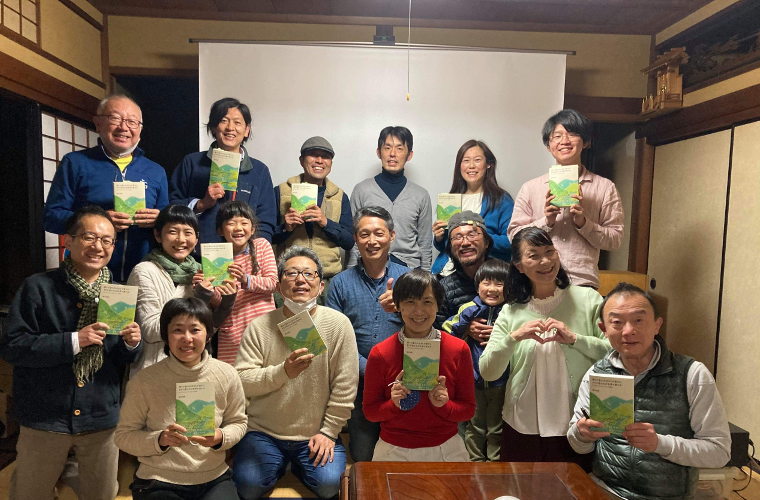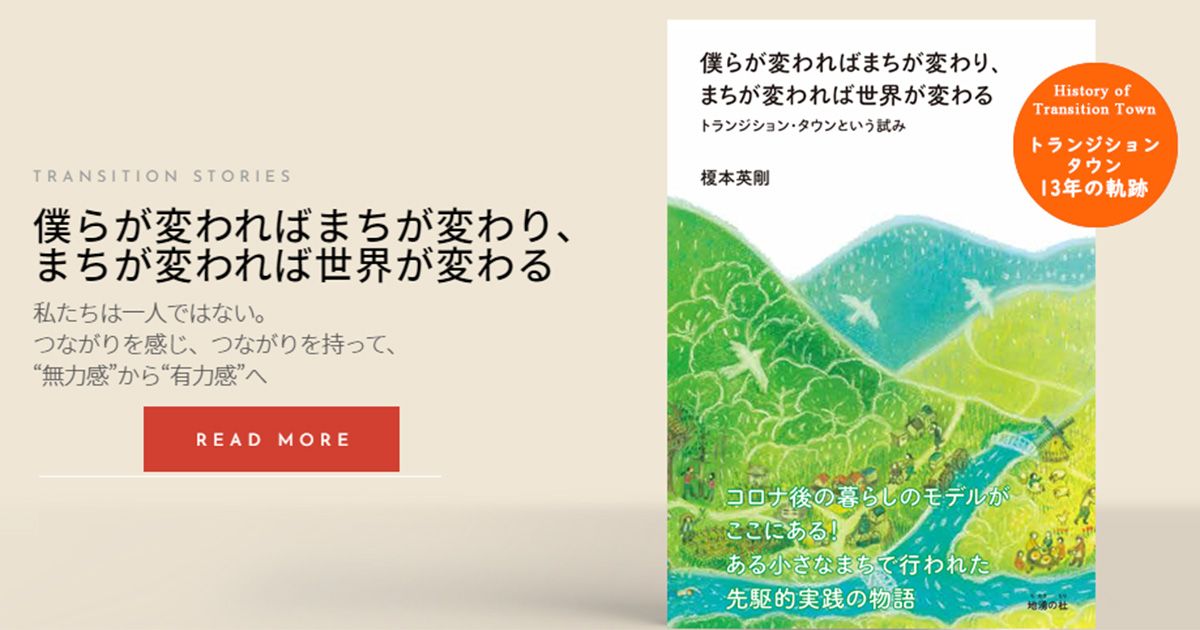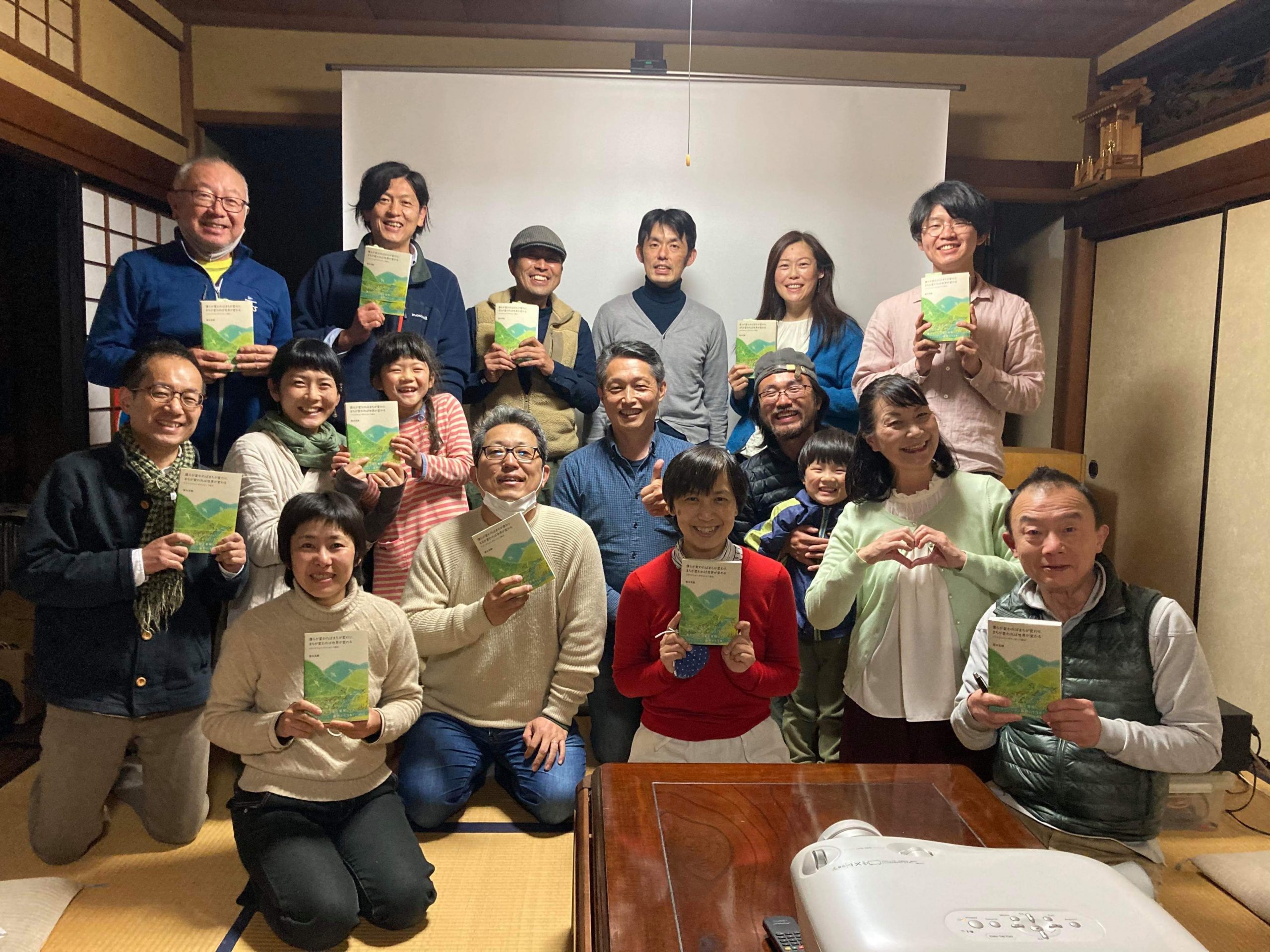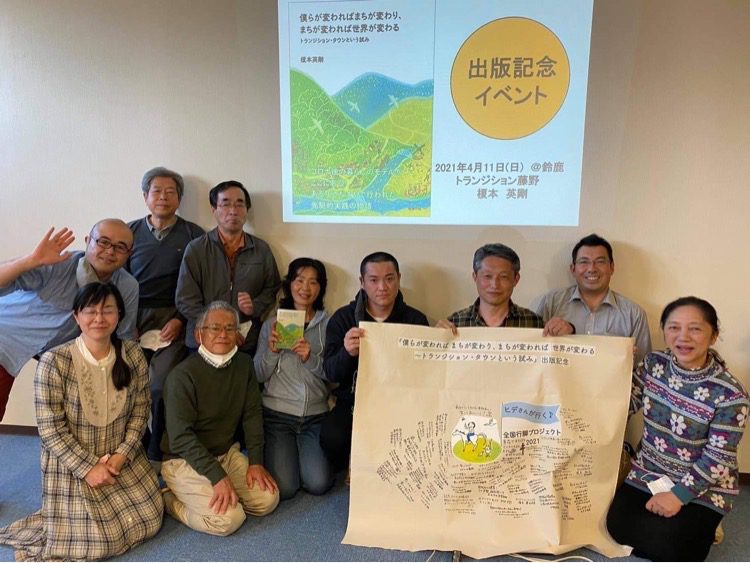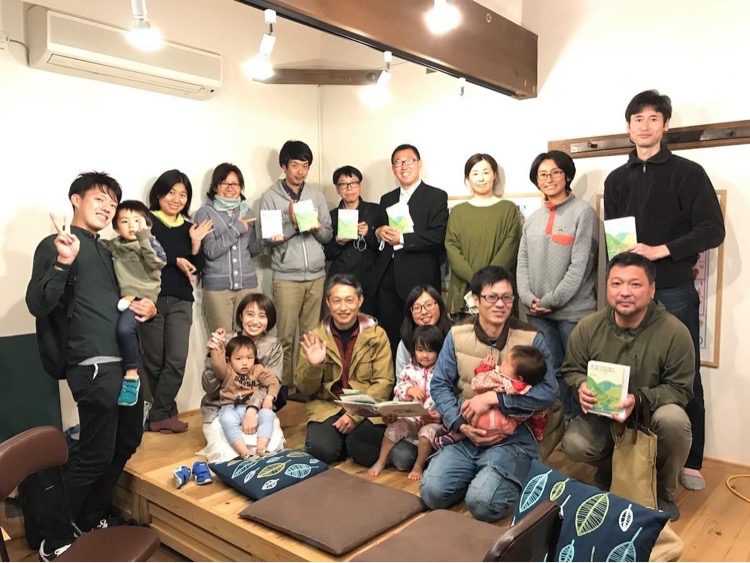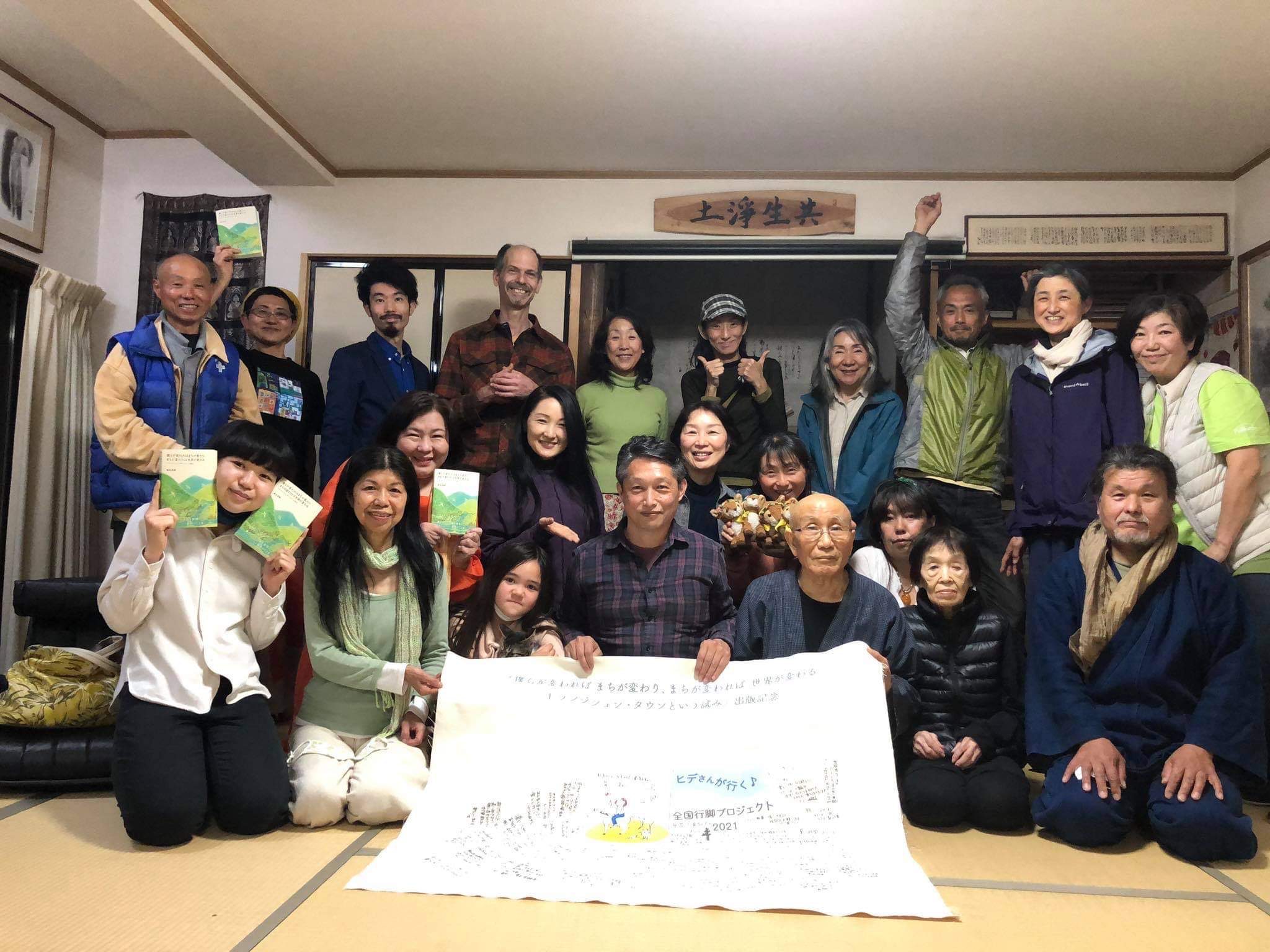Hide Enomoto is one of the pioneers of the Japanese Transition movement, both in his community and in supporting the national movement. He has just published a book capturing the stories and learnings from that movement. Rob Hopkins caught up with him just before he set out on a tour across Japan promoting his book. Here is their conversation, illustrated with images from some of those talks.
Let’s start at the beginning. How did you first come across the Transition movement?
I had been living at Findhorn Ecovillage in Scotland from 2005 until 2008. I think it was 2005 or 2006 that you started the Transition movement in Totnes, so I somehow overheard the rumour through the grapevines that something wonderful was happening. I happened to have a chance to listen to your talk, in November 2007, in a conference called ‘Be the Change’ in London. For some reason even before I listened to your talk, I’ve never read any books or read any articles but something about this word ‘Transition’, ‘Transition Town’, gave me a sense that there is something here. My intuition was confirmed when I listened to your speech. I thought, “This is something that I have been looking for.” Then again in March 2008 you came to Findhorn for the conference called ‘Positive Energy’.
I invited my friends who studied permaculture together with me, before I came to the UK, and three of them came. Four of us attended that conference and listened to your talk, and they all said, “This is great. Let’s do it. Let’s do it in Japan.” Except for one person who had to go back to Japan right away, three of us attended Naresh and Sophy’s Transition training.
We were all geared up before I went back to Japan. Right after I went back to Japan, in June 2008, we started on two levels. On the community level, so I moved to Fujino so I started a Transition movement in Fujino. And Shunro started a Transition movement in Hayama in the same prefecture and Paul Shepherd, who’s a British guy who happened to be living in Japan for a long time also found out about Transition around the same time. He started a Transition movement in a suburb of Tokyo called Koganei.
There were three initiatives that started in the middle of 2008. That’s one level. We also started at the national level. We set-up a non-profit Transition Japan and started to spread the idea around Japan. Since then it’s been a little over 12 years now and we have more than 60 initiatives around the entire of Japan.
So, 12 years and 60 initiatives. What was it that prompted you that it was time to write a book? What did you want to achieve with this book?
I had been wanting to write a book about what happened in Fujino in particular. But it took much longer than I thought. I got busy with other things. It was really challenging for me to find the time to write. I’m not a good writer like you are! I struggled to find the time and keep writing.
But then Covid-19 happened last year, so most of my other work got cancelled and I suddenly had time. I said, “Now is the time, I have to finish this. This is probably the last chance for me to write this book.” I was able to find the time to write finally, and was able to complete at the end of last year.
About three or four years ago I felt that we have done enough to be able to share with other people in Fujino. There are lots of visible projects that happened and I have been invited to give a talk about what we did in Fujino, and each time I talk about this people get excited. I thought there’s something about this story that is happening in Fujino that I need to share more widely by writing the book. My plan was to finish it three years ago!
Could you share some of those stories with us? What has happened in Fujino? What is the Fujino story?
There’s the story about the Fujino Electric Company where we started this workshop to set up a mini-solar electric system that kind of caught fire. Not just in Fujino but all around Japan. Because of the naming of ‘Fujino Electric Company’ people started to have this idea, “Oh, it’s okay to set up our own energy company!” Until then, all the energy companies were big energy companies like Tepco, Tokyo Electric Company. People didn’t have an idea that it’s possible to set up our own energy initiative.
Fujino Electric Company became a precursor to the kind of movement that took place in Japan following the triple disaster in 2011, the big earthquake, the tsunami and the nuclear fall-out. The name Fujino Electric Company became even more famous than Transition Fujino. So many people know about Fujino Electric Company but not many people know about Transition Fujino, which I think is okay. What I found is that Transition initiatives are like preparing the soil, a fertile soil where this kind of visible project can grow. I think that Transition Fujino’s work over the years has been to tender to enriching this soil so that these kinds of visible projects pop up. Fujino Electric is one.
We have a local currency called Yorozu which I think between 5 and 10 percent of the entire population in Fujino has now joined. It’s quite active. People have been exchanging. It’s based on LETS (Local Exchange Trading System). We don’t have actual bank notes or coins. We don’t have an electric system that you have in the UK, but this LETS system has been working well for us.
The exchange of goods and services has been quite active until today. What’s great about this system is it does not only serve as a medium for exchange, but it serves for other things. It’s a really great way to make explicit what kind of resources people in the local community have, because people write down what kind of exchange they did in the notebook, and whenever you do an exchange you have a chance to look at all the previous exchanges that have happened. And people say, “Oh, wow, I didn’t know he speaks Chinese, or he’s very good at computers or he has a big chainsaw, or whatever.”
Hide on tour promoting his book.
To uncover the resources that already exist in the local community, not just natural resource, but the social resource, including the history, the culture, and the people, and people have not only the knowledge and skills but they have passion and ideas. These are all resources. How can we make it visible so that we can enable people to connect these different resources together? The local currency group was the very first working group that was established in Fujino. We didn’t plan this. As I look back, that was the greatest place to start because through that local currency system the local resources became more visible. It became like an infrastructure of all the other things that happened afterwards.
Another typical thing that happened in Fujino was what we call a Forest Club. 80 per cent of Fujino is forests. When you look from afar it looks beautiful. It’s all green and beautiful. But once you go into the forest it’s not a good forest. What I mean by not good forest is that it’s not being taken care of because the logging industry in Japan is not doing well, so the owner of the mountains is not taking care of their forest because it’s not going to make any money for them. They stopped maintaining the forest, so once you go in there are only forests with – I don’t know if you know much about forestry but when you maintain the forest you need to thin the forest, thin the woods.
This thinning is not happening in Japanese forests so that means there are very weak and small trees that don’t take root so when the big rain falls it does not store the water. It often creates landslides and as the weather pattern changes as a result of climate change, we are seeing a lot of landslides happening all over Japan. They say it is because of the change in the weather patterns. But they are missing half of the equation because it’s happening because we are not taking good care of our forests. In the past maintaining the forest belonged to the professional arena.
Because the Japanese logging industry hasn’t been doing well for the last twenty to thirty years all the professional foresters have become very old and the new ones aren’t coming. There aren’t enough foresters. It’s a dangerous thing if you’re not used to it. We found a way for the novice people to maintain the forest in a safe way. It’s called bark peeling thinning. What you do is you cut the bottom part of the tree. You don’t cut fully. You just cut it enough so we can peel the bark. Once you cut the bark of the cedar trees it’s easy to peel the bark. Even children can do that. When you peel the bark because the water doesn’t go up the bark the tree dies after a year. So by the time we cut the trees the water has vapourised so it’s not dangerous when you cut it. It’s very light.
The most dangerous thing about maintaining the forest is using the chainsaw. If you’re not used to it you cannot control which direction the tree will fall. If the tree is dried up it’s light so it doesn’t kind of fall down. It’s not dangerous. That’s how it works. We formed a forestry club and we go into the forest as a way to enjoy nature. We take our lunch box with us, we take our musical instruments and we go in as a family because even the children can peel the bark. We stay in the forest for a full day peeling the bark, eating lunch boxes together, playing music together. That’s one thing that we are doing. I can keep going but I think that’s enough …
How about more widely in Japan? You said there are 60 initiatives. What’s the current situation? What’s it looking like in Japan at the moment in terms of the Transition movement?
One thing as I look back on this 12 years, one thing that happened after 3/11, the triple disaster [earthquake, tsunami, and nuclear meltdown], people were not only shocked, but they were awakened. Before the 3/11, when I was talking about Transition Towns, people said, “Why? Why do we need to Transition?” But after 3/11 people stopped asking me why because they understood the reason. Of course we need to make a Transition. But how do we do it? The question that I’ve been asked has changed from “Why?” to “How?” It’s actually shown in the increase in the numbers of the Transition Towns after 3/11. Until then it was slow gradual growth, but after 3/11 the number of Transition Towns in Japan, the pace has increased. That was a big turn of events.
What else? If I were to come up with some reason why I wrote this book and finished this book in a hurry is that I am assuming that the same thing would happen after Coronavirus. This is another big shock. It’s a big shock and I feel that people are noticing that they need to change the way that they have been living their lives. If I finish writing this book I think this can contribute to people, those who are noticing that they need to change how they live their lives but they don’t know how. This book can provide some directions. It’s not the answer but it’s definitely one of the answers for after Coronavirus, I believe.
What has surprised you over that time, since you brought it back? Have there been any key moments that have been a real surprise?
I don’t know if I can call it a surprise, but I can think of one moment that really touched me which is again going back to this 3/11. Right after this triple disaster happened, I was in shock. I was in a shock and didn’t know what to do. Many people in Fujino, especially those families who have young children, were in panic. They started to move overseas or they moved to the west because they were concerned about nuclear fall out. We had a small child back then, so we actually considered about moving. I think there was an uncertain feeling all around the Fujino community.
Then somebody in the community said, “I’d like to take the surplus food and the daily goods that are not being used to Tohoku area”, the north east area of Japan which was hit by this disaster, to help those who are in need. This news went around this mailing list that we use for local currency. All of a sudden people said, “Okay, we’ll bring all our foods and clothes that we’re not using.” Within a day or two, lots of things gathered and lots of people came to pack things up and then a truckload of this surplus food and goods was taken to the disaster area.
I still remember feeling the shift in the energy in the community. Before this everyone was panicked and they were in fear. They were really focusing on oneself. The attention was on ourselves or on our family. We were not looking at the whole. But as soon as that message was shared in that mailing list, it’s almost like they remembered all of a sudden that we are not just ourselves. We are living in communities and there are communities out there who are in need. We’ve got to do something about it. Even though we are still in fear, as we started thinking about other people who are in need and started acting, taking action, it seems like there was a shift in the energy from being in fear and also the energy of hope.
I was so touched by the goodness of humans. They were in fear, they didn’t know what to do, but they still nevertheless put their food and goods for the other people who were in a greater need. I think that’s what I want to believe about human nature. Not just thinking about ourselves, but thinking about other people and other communities.
What have been the main challenges, the main obstacles to the spread of Transition in Japan?
To a certain extent it still is a challenge, is that the more rural you go, in the rural communities, and also the more elderly you are, there is a sense of resistance towards anything that comes from overseas. So we have been trying to talk about Transition without using the word Transition. Or any other foreign imported concept. We are still talking about Transition but if we talk to these elderly people in rural communities using lots of foreign imported words, they would go like this… “ I don’t want to hear any more.” To find a way to explain these concepts without using those foreign words has been a challenge.
After ten years we have found a way. In a way this book that I just wrote, even though I use the word Transition and so on, it is sort of like an accumulation of all the ways that we have been finding to explain these concepts in a way that doesn’t use a lot of foreign imported words and makes it more understandable, even for the elderly people in the rural community.
You’ve been around this set of ideas and around this movement since 2007. What would you say were the key things that it has taught you? Or in what ways has it changed you? What impact has it had on your own life and thinking?
It’s related to what I was sharing earlier. Through being engaged in Transition movement for the last ten years or so I became more confident about the power of community. I feel like I’m more trusting and also one thing is that until I moved to Fujino I never lived in the same community for more than five years. Partly because of my upbringing. My father was working for a bank and if you work for a bank you get transferred every three years or so. I never settled down, even after I grew up and became independent.
When I came back and moved to Fujino, I had a strong intention to make this my own community. I’ve been living here ever since. This is the longest record for me for living in the same community for this many years. Not only the length of time but because of my involvement in the Transition movement I feel more rooted and grounded in this community, which is a feeling I’ve been longing for for my entire life. Thanks to the Transition Town movement I think I’ve finally found my community.
Even in my college days some of my friends had been living in the same community since their birth and they often talk about ‘my town’, ‘my home town’ and I used to envy them. I don’t have my home town. But now I can confidently say that Fujino is my home town. It became my family’s home town, especially for my daughter, who has been living here since she was three and she’s now sixteen. I can’t believe how fast children grow!
My last question is just what are your hopes for this book? As it goes out into the world? You’ve spent the last couple of years working for it. If all of your hopes for this book in the world were realised, what would that be?
The direct translation of the title of this book is, “If we change, the community changes. If the community changes, the world changes.” My hope, therefore, is included in the title. It starts with us. This is really to your previous question that one of the wonderful things about Transition is that it’s a great educational programme. People go through transformation through being involved in this movement.
I hope that by reading this book, starting with people in Japan, people get to start to see that they don’t have to be a victim of what happens in the world. You can start right there, where you live. And if you just shift your mindset a little bit and believe that by changing this victim mindset, of that I’m feeling miserable because this or that, we have a power to change things and we don’t have to say we can change the world. That’s too big. But if you look at this local community that you live in, you can imagine yourself having an impact on your local community.
If everyone in every local community starts to believe that and starts to take action, then there will be a synergy and this kind of community transformation would accumulate. It’s like a ripple effect and it spreads all over the world. It is already happening. But I hope that the ripple will be bigger and stronger in Japan through this book. That would be my hope.
Thank you so much.
You’re welcome.


